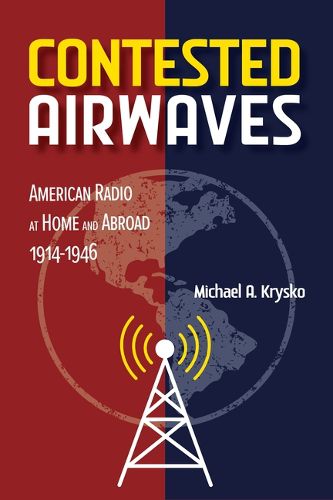Readings Newsletter
Become a Readings Member to make your shopping experience even easier.
Sign in or sign up for free!
You’re not far away from qualifying for FREE standard shipping within Australia
You’ve qualified for FREE standard shipping within Australia
The cart is loading…






Controversial American-led radio initiatives sparked a kaleidoscope of conflicts and rivalries from the medium's earliest days through the end of World War II. Michael A. Krysko explores how the medium engaged the knowledge, assumptions, and prejudices that fueled listeners' and policymakers' objections to foreign and unwelcome radio content.
Krysko considers Americans' antagonism toward non-English language broadcasting; issues of identity, geography, and sovereignty that propelled opposition to Mexico's "border blaster" stations; how a project aimed at helping Cajun-speaking listeners became a French-only celebration of Acadian culture; a failed initiative to teach English to Latin Americans via shortwave broadcasting; enduring US-Panamanian conflicts over the control of radio in and around the Panama Canal; and how farmers from across the Southwest protested a radio treaty's perceived preferential treatment of Cuba. Paying particular attention to the act of listening, Krysko shows how these initiatives illuminated and solidified divisions rooted in identity, nationalism, and prejudice.
Clear and wide-ranging, Contested Airwaves reveals early radio's place at the nexus of public programming, transnational relations, and its own evolution as a communication medium.
$9.00 standard shipping within Australia
FREE standard shipping within Australia for orders over $100.00
Express & International shipping calculated at checkout
Controversial American-led radio initiatives sparked a kaleidoscope of conflicts and rivalries from the medium's earliest days through the end of World War II. Michael A. Krysko explores how the medium engaged the knowledge, assumptions, and prejudices that fueled listeners' and policymakers' objections to foreign and unwelcome radio content.
Krysko considers Americans' antagonism toward non-English language broadcasting; issues of identity, geography, and sovereignty that propelled opposition to Mexico's "border blaster" stations; how a project aimed at helping Cajun-speaking listeners became a French-only celebration of Acadian culture; a failed initiative to teach English to Latin Americans via shortwave broadcasting; enduring US-Panamanian conflicts over the control of radio in and around the Panama Canal; and how farmers from across the Southwest protested a radio treaty's perceived preferential treatment of Cuba. Paying particular attention to the act of listening, Krysko shows how these initiatives illuminated and solidified divisions rooted in identity, nationalism, and prejudice.
Clear and wide-ranging, Contested Airwaves reveals early radio's place at the nexus of public programming, transnational relations, and its own evolution as a communication medium.